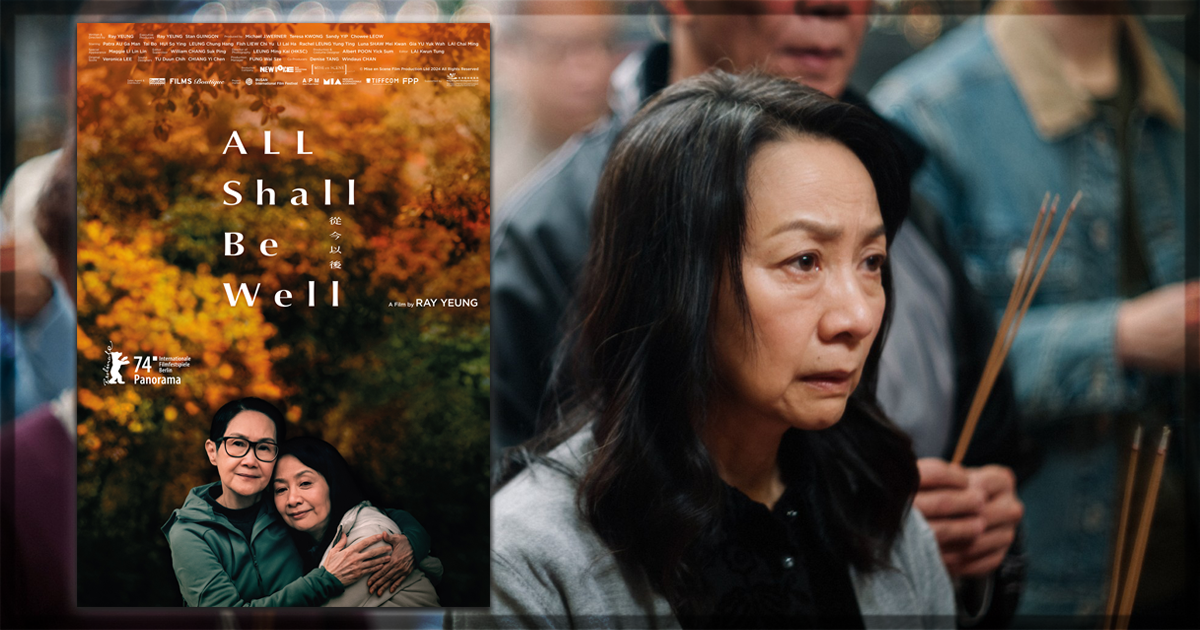Ray Yeung’s elegant and tender film All Shall Be Well begins with protagonists Angie (Patra Au Ga Man) and Pat (Maggie Li Lin-Lin) existing happily together as an elderly lesbian couple, their bond silent, no unnecessary words spoken between them as they eat, get ready and walk along an autumnal path. They’ve been together for over 30 years and are settled in their daily rhythms. The home they bought together feels cozy and inviting, lit warmly with the soft glow of content love. They’re preparing for their mid-autumn festival dinner, a meal that invites families together to metaphorically break bread, or in this case, yolk-filled mooncakes.
The scene is slight and mellow, with Pat existing as the bridge between Angie, her long-term partner, and the large family that has come to eat curried crab. This soft scene is filled with Pat and Angie’s generosity and love, the blood relations of Pat welcoming Angie as their own, as they have done for most of their lives. The two cannot get married due to Hong Kong’s law on queer marriage, but they have lived together as equal partners in domestication and finances. When Pat dies suddenly, and without a will, the status quo between Angie and Pat’s family is upended. The house that the couple bought together becomes a topic of dispute, and her burial wishes, once spoken out loud within the confines of their relationship, are dismissed in favor of spirituality.
Pat’s death is devastating for Angie
With the passing of Pat, Angie spirals, their once vibrant house now dour and deathly quiet, the color that was once prevalent over each inch of the frame drained from the picture. Pathetic fallacy in effect, the grey weather and muted sound design acts as a reflection of Angie’s grief. Outside of a greatly affecting scene where we witness Angie cry, the loss is felt through a series of small references to the vacuum left by Pat. Lin-Lin’s jovial charm as Pat helps the first scenes absorb the audience within their sweet dynamic before her tragic departure from the picture, and the loss is felt by the film and Angie in equal measures, the audience mourning the loss alongside Angie. The reverberations of her passing impact everyone who was once touched by Pat’s magnetism, generosity, and infectious spirit.

The central conflict in All Shall Be Well surrounds inheritance
The inheritance situation becomes delicate and is the central conflict in the film. Yeung’s masterfully ethereal touch here is so vital when crafting a film that is trying not to be melodramatic. Yeung refuses to paint anyone in the family as acting with heinous intentions, each person slightly sympathetic and logical in their reasoning, especially as they’re within their legal rights as direct beneficiaries. It’s in this space where we find the moral quandary around what true acceptance is, the theme propelling the film forward as we see Angie’s world slowly crumble around her, especially as the family begins to declare the aged couple as solely best friends.
Pat’s brother Shing (Tai-Bo) has financial worries and unemployment issues due to losing a business and has begun working night shifts in a parking lot. The job pays little, with leeching bosses refusing to pay benefits, and the intrinsic belief that Shing has in the nature of luck ripples throughout his actions as he believes it to finally be his turn.
All Shall Be Well uses the Hong Kong housing crisis as a stand in for the crisis worldwide
One of the many pointed conversations Yeung is attempting to start with All Shall Be Well is the housing struggle experienced in Hong Kong, one not dissimilar to the crisis occurring in cities worldwide. This is shown through nephew Victor (Leung Chung Han) and his partner, who are struggling to find a house. That Victor has benefited from Pat’s generosity (Pat gives him money to fix his Uber in the opening sequence) so much is the driving force behind a lot of his actions in the film. It is a main element in the third act, where Yeung drives home the tragedy in losing a partner in a society that doesn’t recognize your right to exist as a queer couple.
All Shall Be Well is an intriguing and morally tricky film
That All Shall Be Well could easily have found itself descending into melodrama is a testament to Yeung’s deft hand guiding the film. His film refuses to stand on a soapbox and use family drama to instill a didactic impression on the audience. Instead, its apprehension feels less like avoidance and more that his feelings on Hong Kong’s queer marriage rights, spirituality, and the housing crisis are worth using as background to a rich, satisfying drama on acceptance.
The fact that governmental failings strip away the individual choice is one of many aspects that make All Shall Be Well such an intriguing, morally tricky film, where the acceptance and rejection of found family are linked to accepting a marginalized life. For all the tenderness that Yeung imbues his film with, the film has a powerful inflammatory voice underneath its pregnant pauses and meticulous craft. It is a film about grief, but one that begins a conversation on the grief we should all have while living under oppression.
All Shall Be Well is now playing at the Berlin International Film Festival.
Are you curious about Ray Yeung’s film? What do you think of the message of All Shall Be Well? Connect with us on X @MoviesWeTexted to let us know your thoughts.
For more information about All Shall Be Well, visit the Films Boutique website.
You might also like…
‘How to Have Sex’ Review: A Quietly Devastating Drama with Mia McKenna-Bruce



